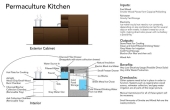


urbanresistance McCoy wrote:Here this seems very relevant http://zinelibrary.info/primitive-toothcare-diy-guide-uncivilized-oral-hygiene
Steve Zoma wrote:I think in the big scheme of things, while financing may seem like the ideal situation, in the end it actually may rob you of some really good experiences.
One trend you will notice on this alternative housing is there low costs, and that is for a reason. There is a primal need for housing, but it does not have to mean you go in debt to get that housing that is needed. At looking at it from a different perspective, you not only get a self-build home where you have a huge amount of personal investment into it (also called sweat-equity), but you also come out on the other side owning it outright.
It really does not matter what type of house build we are talking about here: WOFATI, Earthberm, Container, Cordwood, or how I built mine, timber frame but using 90% of materials I found on the farm. Material costs are reduced so that as the house has aspects of it that are completed, it is owned outright as you go along. And if you own it outright, you don't need insurance.
But acquiring the material needed at such a low cost that a loan is not needed is a skill-set and experience all on its own. It takes looking at things from a different point of view. Just as an example, what happens if I bought a two acre house lot because it is all I could afford, but there is not enough trees on it to build a cordwood home? Well, I would probably use earthcrete to make a slab for my house first which only requires buying a few bags of portland cement and mixing it with existing earth. Then I might go to a firewood dealer and have a few cords of tree length firewood delivered. A cord of wood would make a lot of walls and yet only cost me $100. I could probably find free windows somewhere, and then buy rough framing lumber, rough sawn boards and finally buy new or used steel for the roof.
The point of all that is NOT to say how to build your home, but show that by attacking the problem from a different point of view, you can make your home. I mean who would ever think to buy tree length firewood to put up walls for a house? You need a lot of trees on your land right? Nope? You need a sawmill to make boards right? Nope, just a chainsaw if you have a cordwood home. The point is, why waste your time trying to secure financing to people who do not care about your home. In the same amount of time as you trying to convince people to lend you money and insure the loan, you could have built a small home for you and your family out of pocket. You do not have to write a check for it, and when you do as much as you can for yourself, you actually own it, and are not subjected to societies rules like insurance. (I don't have homeowners insurance). Is there risk? Sure, but The Greater the Risk, the Greater the Reward too. Some have said I am fearless, and that is NOT true, I just have confidence in myself, but part of that has been from providing for myself for years.
Today it is sad, jump on many forums today and ask a simple question and 19 out of 20 people will tell you, "Oh you cannot do that". What I love about Permiculture is that you will be inspired to do things differently. In the end, building your own place will rid you of the one thing that trips so many people up today, instant gratification. But rid yourself of that, and the world is your oyster. A lot can be accomplished when a little is done often.
